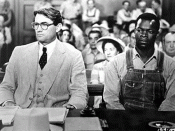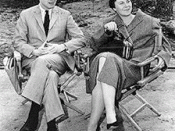"Ideals are like stars, we never reach them, but like the mariners of the sea, we chart our courses by them." This quote taken from Carl Schurz sums up a large portion of man's travel down life's path. Most of us spend the majority of our lives pursuing goals but few ever reach the climax of their planned accomplishment. A man's struggle to reach his person ideal is accounted in the novel To Kill a Mockingbird, written by Alabamian author Harper Lee, through a series of events circling a court case. A social drama set in the rural county of Maycomb, Alabama, relates the events surrounding a dark trial from a young girl's standpoint. The defendant, a black man wrongly accused of the raping and beating of a white woman, was not the only one put on trial; also being tried by Maycombian society is Atticus Finch, the Negro's lawyer.
This trial is not one of legal matters but rather a personal one for Atticus. Throughout the novel he fights to keep on the right track en route to the stars. What appealed to myself as a reader was his undetoured course in reaching his person ideals and set of morals: his resolute refusal to yield to social pressure, his ardent sense of racial equality, and his ability to risk great sacrifice to remain true to what he believes in.
Atticus has an amazing adherence to his morals; even when surrounded by general disapproval, Atticus and his principles still stand fast. Atticus tells Scout "No matter what anybody says to you, don't you let 'em get your goat." which acutely demonstrate his indifference to public opinion. Despite the opposition of the majority of the county, despite the rank gossiping, and despite the fact that failure was imminent, Atticus Finch still did what he had to. He knew that the case could not be won, and even admitted it to both Scout and Uncle Jack, yet he still argued it because he believed it to be his moral obligation. Even the condescending attitude of his own sister would not change his mind. Atticus had said, "The one thing that does not abide by majority rule is a person's conscience." This kind of devotion to the morality of one's principles not only takes a disciplined mind but also a courageous soul, one that should be admired.
Second of all, Atticus is not prejudiced; in fact, he tries to persuade others to see the light. Atticus understands that "...some Negroes lie, some Negroes are immoral, some Negro men are not to be trusted around women-black or white. But this is a truth that applies to the human race and to no particular race of men." and endeavored to convince the jury. In his address to the jurors during Tom Robinson's trial, he futilely tried to persuade them that the race of a man plays no part in determining his disposition, that all men, colored or not, are prey to the same temptations to sin. Jem and Scout also received edification from Atticus when he teaches them to be impartial to race. After the trial, Atticus tells his children: "As you grow older, you'll see white men cheat black men every day of your life, but let me tell you something and don't you forget it-whenever a white man does that to a black man, no matter who he is, how rich he is, or how fine a family he comes from, that white man is trash." This unbiased view that any man who takes advantage of another, regardless if he were a prince or a pauper, is depraved leads squarely to the conclusion that Atticus is truly a just man. His objectivity to race and his advocating of racial equality, especially in an era unfamiliar to civil rights, is undoubtedly worthy of respect.
Scout and Jem are probably more important to Atticus than anything else in the world, however, to insure that him and his children will abide by the same doctrines that he himself has always followed, he was willing to sacrifice Jem's future. At the end of the book, Mr. Ewell was found dead and Scout was convinced that Jem had killed him. Apparently, so was Atticus. Instead of lying to protect Jem, Atticus was adamant about letting the truth be known. He said, "Best way to clear the air is to have it all out in the open. Let the county come and bring sandwiches. I don't want him growing up with a whisper about him." Obviously, Atticus was more concerned about Jem growing up surrounded by hearsay than having Jem grow up surrounded by damp cell walls. This shows the amount of sacrifice he was willing to surrender to keep his values intact. He was willing to expose his own flesh and blood to the criminal justice system rather than mar the child's sense or right and wrong. A forfeit such as Atticus was willing to pay is worthy of Abraham.
Harper Lee's illustrious descriptions of Atticus's innate qualities elicit empathy and admiration from his reader. People like him are admired because they are "perfect" and always do what is "right." These kinds of people are known as "saintly" and "humanitarian". They are what the majority of the population sees as ideal. They are what the majority of the people strive for. They are what the majority of the people cannot reach.


